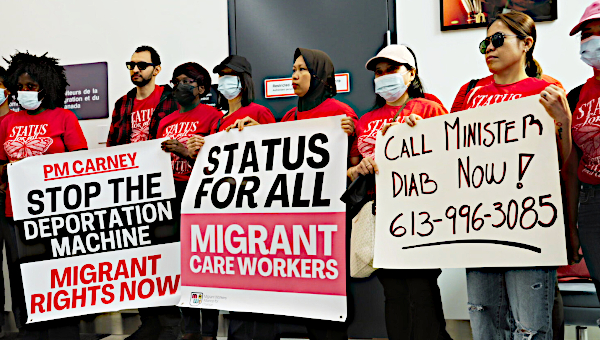Are Mexican Workers ‘stealing our jobs’? The Crisis in the Mexican Auto Sector
When the last truck rolled off the assembly line at the General Motors (GM) plant in Oshawa, Ontario on May 14, some workers arrived at the “closure ceremony” wearing
sombreros to protest the loss of 1,500 Canadian jobs and the announcement of the opening of new GM plants in Mexico.
“It’s not right. They just put the plants in places where people are willing to work for slave wages,” one worker was quoted as saying in the Globe and Mail.
Clearly, Canadian auto workers are being unfairly victimized by an economic crisis that they had no role in creating, but the perception that Mexico workers are gaining because of the crisis would appear to be mistaken.
The devastation of the North American auto industry is also being felt in Mexico, a country heavily dependent on exports to the U.S., and where the auto sector employs some 600,000 workers.
Mexican Job Losses
While Mexico’s share of the total North American auto production rose between 3-4 percent in 2008, exports from Mexico’s auto sector actually dropped by almost 57 percent between January 2008 and
January 2009. This has meant dramatic job losses in many communities in states that are highly dependent on the auto sector, such as Puebla, Coahuila and the State of Mexico.
Temporary closures or production slow-downs – called paros tecnicos – have become the norm. For example, GM’s Guanajuato plant recently began an eight-week paro tecnico which will affect some 10,000 workers. Paros tecnicos are also underway at GM’s three other Mexico plants, affecting over 6,600 workers. The crisis is of course not restricted to production for the big three U.S. auto makers. In January, Volkswagen laid off 900 temporary workers at its Puebla production facility, a factory with a strong independent union.
Mexican auto parts companies that supply the large manufacturers are also feeling the impact of the crisis. For example, last month Delphi, one of GM’s main parts providers, announced the closure of its Matamoros factory, leaving 1,700 workers unemployed.
And, like their North American counterparts, Mexican workers are being pushed to give up hard-won gains.
Impact on Workers’ Rights
According to Blanca Velazquez of the Worker Support Centre (CAT) in Puebla, employers in the auto sector and the state and federal governments are using the uncertainty caused by the economic crisis to undermine Mexican workers’ rights.
“Companies and governments are using the threat of job loss to legalize so-called flexible employment in order to weaken job security and labour protections,” says Velazquez. She points to proposed regressive changes in the Federal Labour Law as well as recent reforms to the Social Security Law.
She also notes that the terms and conditions of paros tecnicos being negotiated by unelected leaders of “official
unions” linked to the Puebla State Government are undercutting workers’ legal entitlements and in some cases are being used to undermine worker organizing.
For example, at the Johnson Controls Finsa plant in Puebla, where the CAT has been supporting a coalition of workers, the company has been disproportionately targeting members of the coalition in layoffs and then replacing them with temporary, casual workers contracted through an employment agency.
While announcements of new investments in auto production facilities in Mexico could offset some of the job losses, it is not yet clear whether there will be an overall employment gain for Mexican auto workers, or whether Mexican workers will continue to be discarded by the industry as readily as their Canadian counterparts. •
This was first published in Maquila Solidarity Update.





